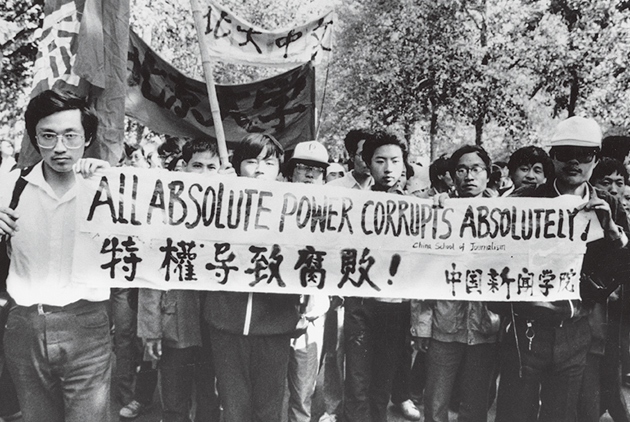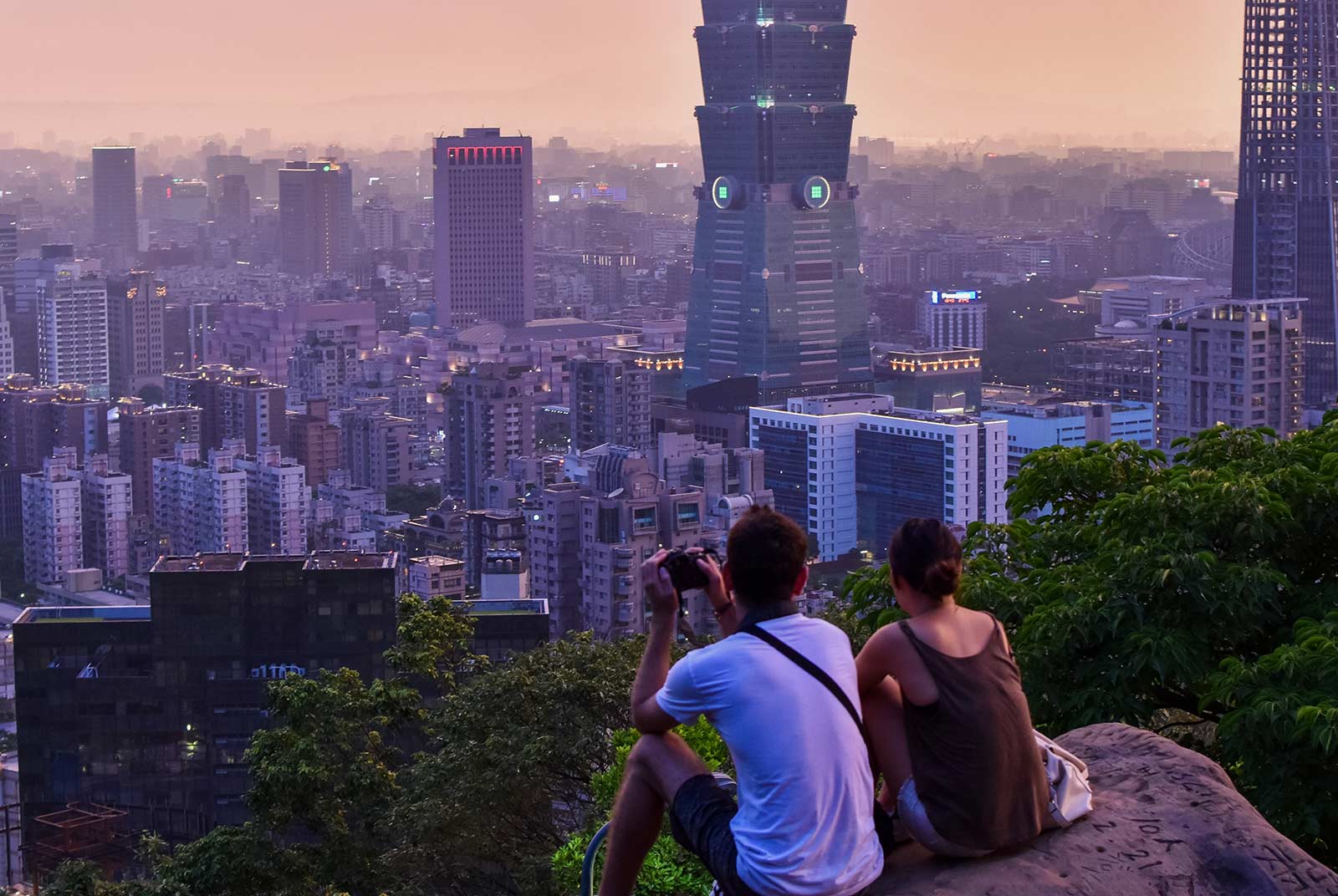1989: On the Eve of the Tiananmen Massacre: Money vs. Power

Source:CommonWealth Magazine
Deng Xiaoping may have opened China’s economy but he held on to absolute power politically. Those opposing forces led to policy clashes that bubbled into the Tiananmen protests. We look back at what CommonWealth Magazine founder Diane Ying saw in Beijing at the end of May 1989.
Views
1989: On the Eve of the Tiananmen Massacre: Money vs. Power
By Diane YingCommonWealth Magazine
(Originally published 1989-06-01)
The Palace Hotel in Beijing is magnificent in its grandeur at night, ringing with sounds of singing and dancing echoing good times. This is a world of money and opulence.
A few blocks away sits Tiananmen Square. Students kneeling outside the Great Hall of the People begging for dialogue with China’s leaders have resorted to hunger strikes without water, hoping to prove with their lives that the student movement is a “patriotic movement” rather than “social unrest.”
Under the sun and rain, students pass out one by one. Television broadcasts show images of a stern, inflexible Li Peng announcing martial law, wielding authority intolerant of even the slightest challenge.
Political authoritarianism co-exists with economic exuberance, laying the foundation for the clashes and contradictions between power and money found everywhere in China.
The roots of the turmoil were planted 10 years ago. When Deng Xiaoping raised the banner of economic reform and opening, he nonetheless maintained political authoritarianism – insisting on upholding the socialist road, the dictatorship of the proletariat, the leadership of the Communist Party, and Marxism-Leninism and Mao Tse-tung thought.
Competing Visions
The economic opening and contact with the outside world have also resulted to a certain degree in an ideological opening. Economic reforms have led to voices calling for the pursuit of political reforms.

(Source: CommonWealth Magazine)
The divergence in the two paths of thought has permeated all corners of the mainland. Intellectuals, revolutionary elders, the country’s leaders – nobody has been left out of the debate.
“China’s biggest threat is the infighting between the two factions over different ideologies and power. It is everywhere. Li Peng and Zhao Ziyang are simply the leading faces of the two schools of thought,” said a source in the news media in mid-April, well before the bloody struggle between the Li and Zhao forces intensified.
To most companies, economic reform, decentralization and the promotion of a commodity economy has simply meant the authority to manufacture goods. Around 70 percent of the purchase of upstream materials and downstream sales remains in the hands of central authorities, leading to the emergence of a two-tier pricing system, featuring an official price and a market price that are exponentially different.
Also, the purchase of materials and sale and circulation of products requires approvals from different government units, resulting in corruption at every level, and these “approval permits” have become valuable commodities in their own right.
In one example, one ton of coal worth 30 renminbi per ton ended up being sold for 300 renminbi a ton once it arrived in Guangdong after different types of “approval permits” changed hands, akin to a futures market in which the more people speculate, the higher the price.
“The two sides have become commoditized. All products must be branded with the mark of authority before they can be sold,” said an intellectual. “One would struggle to find one official who’s honest and clean.”
Parallel Sets of Rules
The chaotic system has encouraged illicit economic activity and an atmosphere of luxury and taking advantage of the state. Over the past year, 41 billion renminbi has been spent on mainland banquets for guests, 30 percent more than the mainland’s entire education budget. Over the past 10 years, US$5 billion in luxury cars have been imported, more than the total amount invested in the domestic car industry in the past 40 years.
But under the Communist Party’s authoritarian rule, no force exists that can check and balance its power. The National People’s Congress and Chinese People’s Political Consultative Conference (CPPCC) are simply for show, and public opinion is defined as the “party’s mouthpiece,” a tool used to propagate the party’s message and control how the public thinks. It has no supervisory function.
Deng, who mounted a comeback after the Cultural Revolution, once said: “What a revolutionary party should most fear is the failure to hear the voice of the people, for the most fearful thing is utter silence.”
After taking control of power, however, Deng did not tolerate the critical voices of intellectuals. With news channels tightly controlled, intellectuals could only hold private discussions hidden from view, their voices unable to reach party leaders or the public.
At the end of April, the sense of injustice and anger that had been suppressed for so long finally erupted into a large-scale democratic movement that urged bringing down official profiteering and fighting for news freedom. It was the first time that China’s intellectuals and people had united together.

(Source: CommonWealth Magazine)
Thoughts of getting rich quickly and engaging in illegal behavior have penetrated all levels of society. The idea that everybody is in business is the new fad, with each person or entity thinking of ways to go into business. Even schools and public agencies compete to see who can make more money faster.
One university superintendent said it was not only research institutes trying to turn a profit through different projects. The school’s personnel office, general administration office, accounting department and auditing unit have also gone into business to make a buck.
This trend is tied to the government’s “fiscal responsibility policy.” Because of the serious fiscal deficits run by the central government in recent years, it launched a policy of requiring local governments to be responsible for their own finances in 1986, in effect having the “central government and local governments eat separately.”
Every province, city and county, every central government agency and local government unit, are each required to raise a specific level of revenue. How they earn the money and how surpluses should be spent is up to them.
That set in motion a frenzy of activity among public agencies to make money, but also created economic divisions leading to chaos. Each locality seized on opportunities they felt could quickly turn a profit, unleashing a major war for materials such as silk, wool and tobacco, and obstacles were set up in resource-rich localities to block the transportation of materials to other regions.

(Source: CommonWealth Magazine)
“The government didn’t do any planning. So big factories didn’t have enough materials to run on while small factories were still operating, leading to empty plants and wasted resources,” said a Shanghai academic.
One recent example of this dissonance involved a 30-square kilometer area (nearly half the size of Hong Kong island) of land behind the deep-water port of Yangpu on Hainan Island. It was leased to Japanese conglomerate Kumagai Gumi for about 2,000 renminbi per mu (equal to about 1/15th of a hectare) to develop, including putting in roads and building a power plant and telecommunication infrastructure. The lease period was 70 years with an option to renew it for another 70 years.
Members of the CPPCC criticized the plan as a new foreign concession that humiliated the country, while others stepped up to defend it. “It’s like Hong Kong. What was wrong with leasing it to foreigners? Once they develop it, we’ll take it back,” one supporter of the plan said.
Though Communist China has “established the country” for 40 years, its decision-making model still resembles the tribal patterns of Eighth Route Army guerilla forces, relying on a tribal elder-like system that has the oldest leaders make all of the decisions. Many of those decision makers are still the revolutionaries who conquered China in 1949.

(Source: CommonWealth Magazine)
“The mainland does not have elections or democratic systems, so whoever participated in the conquest are the ones who have the power to speak and represent the legal system,” explained a foreign academic.
China’s economic reforms have been in place for 10 years, and achieved results in the initial stage that were admired by the world. They ended hunger among the vast majority of farmers and improved the lives of urban dwellers. But they also inspired high expectations for improvements to people’s individual lives that could not be met.
Now, the nouveau-riche are showing off their wealth while the rich-poor divide has widened, corruption has become endemic, nepotism and cronyism are rampant, the caliber of the people and education system remain low, and the government is incompetent, turning the mainland into a land of grievances. The people have lost confidence and faith in their leaders, the system and communism.
A cab driver in Shanghai was full of contempt when he saw the police standing ready to crack down on the student protest.
“The leaders of the people are afraid of the people. Doesn’t that show that the leaders are on the opposite side of the people?” he wondered.
A Public Awakening
Intellectuals comprise the most dissatisfied group. They are not valued, treated as mere tools who do not have the respect of others, and their incomes have tumbled to levels seen in the lower strata of society. They have been full of anxiety as they observe mainland China tumbling into chaos and falling farther behind.

Dai Qing (戴晴), a literary journalist responsible for a well-known “Interviews with Intellectuals” series. (Source: CommonWealth Magazine)
“I’m one of the people who has woken up. It’s painful,” said Dai Qing (戴晴), a literary journalist responsible for a well-known “Interviews with Intellectuals” series. Full of patriotism and love for the country, she has insisted on staying in the country to do whatever she could for China.
“The road of reform is very long and arduous,” she said.
[Editor’s note: Dai was jailed for 10 months after the crackdown on the Tiananmen Square protesters.]
After this turmoil ends, mainland China will eventually settle down.
As for solving the mainland’s systematic economic and social problems, the only hope remains with its intellectuals. Some of them have gone into business and became private entrepreneurs; some are in politics and are part of a group of technocrats that appears to be on the rise. And some are working anonymously in academia, the news media, and cultural circles.
China is at a critical turning point between light and darkness, but even if its leadership wants to once again close itself off, there is no turning back.
Democracy is a global phenomenon that cannot be halted. Ten years of China opening its economy have resulted in every coastal province becoming inextricably linked to the outside world, and the country’s people have woken up.
“This is the first time the people have had subjective consciousness,” said one artist. “When we heard the term ‘democracy’ in the past, we never had the chance to ‘taste’ it. This time, they can fight for it. There is a lot of hope for China’s future.”
Have you read?
♦ 1984: The Legend of Chang Yung-fa, the Container Shipping King
♦ 1983: Who defined the Taiwan lifestyle?
♦ 1988: The rise of Tsai Wan-lin, the richest Chinese in the world
Translated by Luke Sabatier
Uploaded by Penny Chiang






